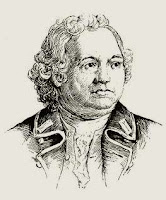“Capt. John Callender is accordingly cashiered”
As I related back here, Gen. Israel Putnam insisted that an artillery captain he had met on the battlefield be court-martialed for abandoning his cannon. That process had a false start, but by the time Gen. George Washington settled into his new job in Cambridge the verdict was awaiting his approval.
On 7 July 1775, the commander-in-chief’s general orders made a big deal of his decsion:
It is with inexpressible Concern that the General upon his first Arrival in the army, should find an Officer sentenced by a General Court Martial to be cashier’d for Cowardice—A Crime of all others, the most infamous in a Soldier, the most injurious to an Army, and the last to be forgiven; inasmuch as it may, and often does happen, that the Cowardice of a single Officer may prove the Distruction of the whole Army:Was Washington trying to make an example of Capt. John Callender? He certainly was. His language, especially at the end, closely followed the suggestion of the respected Massachusetts legislator Joseph Hawley, who on 5 July had written to him:
The General therefore (tho’ with great Concern, and more especially, as the Transaction happened before he had the Command of the Troops) thinks himself obliged for the good of the service, to approve the Judgment of the Court Martial with respect to Capt. John Callender, who is hereby sentenced to be cashiered. Capt. John Callender is accordingly cashiered and dismissd from all farther service in the Continental Army as an Officer.
The General having made all due inquiries, and maturely consider’d this matter is led to the above determination not only from the particular Guilt of Capt. Callenders, but the fatal Consequences of such Conduct to the army and to the cause of america.
He now therefore most earnestly exhorts Officers of all Ranks to shew an Example of Bravery and Courage to their men; assuring them that such as do their duty in the day of Battle, as brave and good Officers, shall be honor’d with every mark of distinction and regard; their names and merits made known to the General Congress and all America: while on the other hand, he positively declares that every Officer, be his rank what it may, who shall betray his Country, dishonour the Army and his General, by basely keeping back and shrinking from his duty in any engagement; shall be held up as an infamous Coward and punish’d as such, with the utmost martial severity; and no Connections, Interest or Intercessions in his behalf will avail to prevent the strict execution of justice.
…I suggest, that although in the Massachusetts part of the Army there are divers brave and intrepid officers, yet there are too many, and even several Colonels, whose characters, to say the least, are very equivocal with respect to courage. There is much more cause to fear that the officers will fail in a day of trial, than the privates. I may venture to say, that if the officers will do their duty, there is no fear of the soldiery.Of course, it’s one thing to say the system was going to be strict with everyone—it’s another thing to carry that out. Callender wasn’t the only Massachusetts artillery officer who had performed below expectations at Bunker Hill. But the other two were the son and nephew of the artillery regiment’s commander. It took months before they faced courts-martial. “No Connections, Interest or Intercessions” indeed!
I therefore most humbly propose to your consideration the propriety and advantage of your making immediately a most solemn and peremptory declaration to all the officers of the Army, in general orders, or otherwise, as your wisdom shall direct, assuring them that every officer who, in the day of battle, shall fully do his duty, shall not fail of your kindest notices and highest marks of your favour; but, on the other hand, that every officer who, on such a day, shall act the poltron, dishonour his General, and by failing of his duty, betray his Country, shall infallibly meet his deserts, whatever his rank, connexions, or interest may be; and that no intercessions on his behalf will be likely to be of any avail for his pardon.
Calendar eventually returned to the army. Of the Gridley cousins, Scarborough was convicted and cashiered, Samuel acquitted, but neither was in the Continental Army at the start of 1776.



